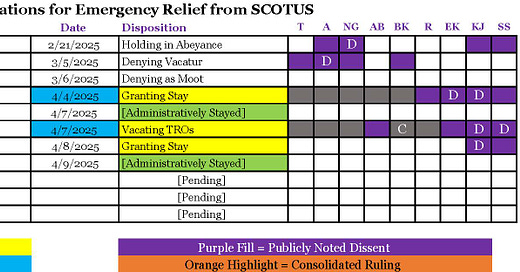Bonus 140: The New (and Sort-of-Improved?) Shadow Docket
We're starting to see patterns in how the Court is resolving emergency applications from the Trump administration. One of them reflects a remarkably positive shift. The others are ... more troubling.
Welcome back to the weekly bonus content for “One First.” Although Monday’s regular newsletter (and all of the unscheduled, breaking-news-driven issues) will remain free for as long as I’m able to do this, I put much of the bonus content behind a paywall as an added incentive for those who are willing and able to support the work that goes into putting this newsletter together every week. I’m grateful to those of you who are already paid subscribers, and I hope that those of you who aren’t will consider a paid subscription if and when your circumstances permit.
As you’ve likely noticed, we’ve received three major rulings from the Supreme Court in the last six days on emergency applications from the Trump administration, all of which granted the federal government’s underlying requests—albeit in ways that, in each case, assiduously avoided endorsing the government’s conduct on the merits. (Here’s the newsletter on Friday’s Department of Education ruling; here’s it on Monday’s J.G.G. ruling.) There are also a pair of administrative stays from Chief Justice Roberts now in effect in the Abrego Garcia and Harris/Wilcox cases, but I’ll have more to say about those when the full Court rules.
Three decisions is a small dataset from which to draw too many conclusions. But there are a few common elements to the rulings that I wanted to highlight in today’s issue—one of which strikes me as a very significant (and salutary) shift in how the Court is handling at least some emergency applications; and the rest of which strike me as far more problematic. To skip to the punchline, the Court (at least in these cases) appears to be committed to providing even a brief explanation supporting grants of emergency relief—something that was not a given as recently as January, and for which folks like me have been clamoring for quite some time. That strikes me as an unalloyed positive—and one for which the Court should be commended.
But part of why I think it’s so critical for the Court to write is so that its interventions can be subjected to scrutiny—to see if the reasons for providing emergency relief are persuasive. And here, there are at least three respects in which these rulings have left much to be desired—wholly unrelated to their bottom line. Simply put, it’s wonderful to see the Court finally committing to writing in these cases; it would be even better if the opinions it produced tried to persuade, and not just rationalize.
For those who are not paid subscribers, we’ll be back on Monday (if not sooner) with our regular coverage of the Court. For those who are, please read on.
Keep reading with a 7-day free trial
Subscribe to One First to keep reading this post and get 7 days of free access to the full post archives.




